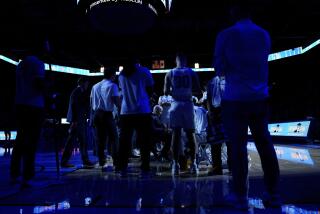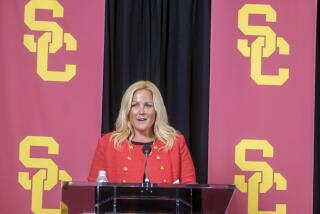Have Safe Weekend, Coach Urges Aztecs : Colleges: Crime stories abound nationwide, so Luginbill reminds players to act responsibly during idle time.
- Share via
SAN DIEGO — “Hey, let’s be careful out there.”
--Sgt. Phil Esterhaus, Hill Street Blues
Momentum is with them, luck has visited, but a game is absent this weekend.
And that worries San Diego State football Coach Al Luginbill.
The Aztecs (1-0-1) are ranked No. 23, and Luginbill hates to see their season interrupted--if only briefly.
But when he addressed the Aztecs after practice Friday, the subjects were alcohol, parties and women.
When there are games, Luginbill and the Aztec coaches are with the players from Friday afternoon until late Saturday night--Sundays if it is a road game. But when there are no games, there is only time. And time can get athletes into trouble.
“It’s my biggest nightmare,” Luginbill said. “I think of it constantly. It’s like raising 90-some sons and, when one of them goes haywire, I take it personally. . . .
“The common denominator to most trouble is not drugs anymore. It’s alcohol. We talk with our players about date rape, AIDS, substance abuse. We don’t hide that stuff. I’m not afraid to talk to them about that stuff because they’re not going to be shielded when they walk away from this university.”
College athletes seemingly have gotten into trouble more than ever during the past year. Defensive backs are not only intercepting footballs--they are picking off other people’s credit cards. Quarterbacks’ audibles now include getting arrested on felony burglary charges.
“In the last five years, I’ve noticed the ‘jurisprudence’ sections in newspapers (sports sections),” Luginbill said. “We never used to have that.
“There is so much pressure on these 17- to 22-year-old kids to perform in class, on the football field, and to be model citizens. If they screw up in any area, the hammer comes down. We try to remind them of these things at San Diego State, and if they have the opportunity to make decisions, maybe somewhere in their minds it will click, ‘This is wrong. I’m going to embarrass myself, the fans and my teammates.’
“We don’t want to be on the cover of Sports Illustrated, or the Los Angeles Times, or the San Diego Union-Tribune with negative publicity for our football players. Our intent is to be a first-class program. You don’t have to be goody-goody, but you can walk away from some instances that you don’t have to be involved in.
“You don’t have to be macho. These guys are already tougher than 95% of the people out there.”
Still, crime is in attendance more and more on college fields. Flanker-return specialist David Palmer has been suspended at Alabama after two arrests for drunk driving. Two wide receivers have been suspended at Penn State after being arrested for burglary, theft and receiving stolen property. Three other Penn State players were cited after an off-campus fight, and another will go on trial later this year on charges of selling cocaine. At Miami, two players--including standout receiver Lamar Thomas--were indicted for student loan fraud.
The list goes on. Fifteen Arizona State athletes have been involved in run-ins with the law in the past 14 months. This week alone, an Ohio player was arrested for allegedly driving a stolen car and a Louisville player was charged with rape.
“My mom lives in (Phoenix) and she told me about the Arizona State situation,” said SDSU cornerback Damon Pieri. “In their first game, against Washington, their top two quarterbacks were suspended. The Washington Huskies against the Arizona State Criminals--that’s what they were calling it.”
The Arizona State Criminals. State Penn. The nicknames are much more cute than the actual transgressions.
The Aztecs have not been totally on the sidelines. Linebacker Tracey Mao was arrested on felony assault charges two winters ago. He was retaliating for an incident in which quarterback David Lowery sustained a broken jaw. Mao, intoxicated at the time, spent a year in a halfway house, was suspended from the SDSU football team and had his scholarship revoked by Luginbill.
Mao, who still attends Alcoholics’ Anonymous meetings, has returned to the SDSU team this season but was not given his scholarship back. By all accounts, Mao has grown up immensely in the past year.
“After the BYU game, my first thought was, ‘I think I’ll drink tonight,’ ” Mao said. “It surprised me. I was thinking about how happy everybody was, and everybody was thinking about a victory party. But that lasted maybe a minute.
“Nobody can predict what’s going to happen tonight. You’ve just got to make smart decisions.”
The BYU game nearly related to what could have been another Aztec disaster. After the Aztecs returned from BYU last Friday, offensive lineman Carlson Leomiti got into an argument in the parking lot of a 7-Eleven and had a gun pulled on him. The gun-wielding man was arrested before any more trouble developed, and nobody was hurt. But Luginbill has since banned his players from patronizing that particular store.
Luginbill hesitates to use the word “babysitting”, though, when talking about a coach’s responsibility.
“I don’t think it’s babysitting,” he said. “It’s taking accountability and responsibility. If a coach neglects his accountability and responsibility away from the classroom and the field, he deserves whatever happens to his athletes.
“There are 24 hours in a day. Two-thirds of that is away from the football field. You can’t forget about that.”
Part of the current problem in college athletics, says Pieri, is that the NCAA will not allow coaches enough visits with recruits. Coaches are allowed only three face-to-face meetings with recruits.
“I think coaches need to analyze more,” Pieri said. “They look at film and they know what they’re getting. But if you can’t go in the home and know what kind of family values and home life there is, I think it is hard for them.”
It used to be that the NCAA allowed three visits with a recruit in the home and three more anywhere else. And in the old days, coaches could visit the schools once a week.
No more.
“It’s just tough to get to know a recruit,” assistant coach Ed Schmidt said. “Especially when you’re checking out character. You spend a lot of time asking the janitor, high school coach, assistant coaches and cheerleaders questions. You try to get as many opinions as you can.”
And once the players arrive, Luginbill and his assistants talk to them. After practice--and Luginbill’s talk--on Friday, the defensive backs went into their own meeting and, when it ended, secondary coach Ron Mims again warned the players to take care of themselves.
“He told us to behave this weekend,” Pieri said. “He said, ‘You represent the school, and anything bad you do is going to be in the papers. He told us to settle down and behave.’ ”
Defensive coordinator Barry Lamb often stresses, “Don’t shoot the sheriff.”
“You’re the mother and father,” Schmidt said. “You’ve got to do a good job. Like my mother and father used to tell me when I went out on a date, ‘Remember who you are.’
“(Off-field incidents) just kill a university--not just a football program. It’s hard.”
Aztec Notes
An NBC TV crew followed Marshall Faulk around earlier this week--including to his classes--for a feature to be shown during halftime of today’s Notre Dame-Michigan State game. . . . Quarterback David Lowery missed practice Friday with back spasms. Several other Aztecs also missed practice Friday: defensive lineman Ty Morrison (groin), defensive lineman Jamal Duff (quad bruise), defensive lineman Steve Matuszewicz (knee), linebacker Terrill Steen (knee), defensive back Damon Pieri (hip) and cornerback Eric Sutton (knee). Sutton is doubtful for Saturday’s UCLA game. Also, four players missed practice with the flu: tight end Alex Semenik, center Mike Alexander, offensive lineman Carlson Leomiti and wide receiver Keith Williams. . . . With the Aztecs not playing today, these assistant coaches are scouting these games: Barry Lamb, UCLA at BYU; Bret Ingalls, Southern Methodist at New Mexico; Dave Schramm, New Mexico State at Texas El Paso; and Ed Schmidt, Colorado State at Fresno State.
More to Read
Go beyond the scoreboard
Get the latest on L.A.'s teams in the daily Sports Report newsletter.
You may occasionally receive promotional content from the Los Angeles Times.










